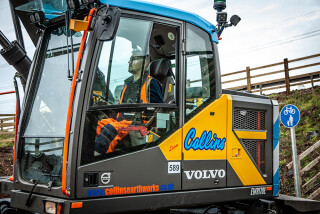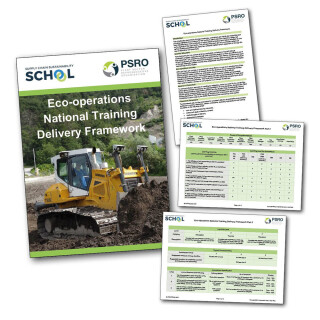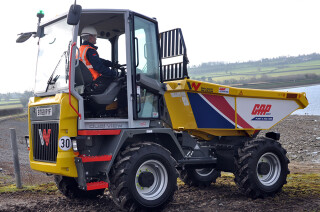Construction equipment today is cleaner and more fuel-efficient than ever before. Since the first European emissions standards for non-road mobile machinery were formulated 26 years ago, emissions from construction plant have steadily reduced, as has fuel consumption.
Driven mainly by increasingly stringent Euro emissions standards, engine manufacturers have refined their technology to the point that tailpipe emissions have been slashed by an estimated 97% since 1999.
Growing pressure from clients also means that clean machines are now considered a prerequisite for any major project – for example, HS2 now insists that all plant on its sites must be powered by engines conforming to at least Euro Stage IV.
But there is one important factor in machine economy and emissions that is beyond the control of the engine manufacturers: the operator in the cab.
Unskilled or inefficient machine operation can vastly affect fuel consumption and engine emissions, and no amount of technical refinement can compensate for a clumsy operator. And since this introduces a human factor, the solution has to be behavioural – and that requires training.
So while you might think you’re a skilled and experienced plant operator, you might have more to learn before you become a sustainable one.
As in every other sector of the construction industry, the plant sector is seeking ways to navigate to net zero and equipment usage has been identified as a significant contributor to carbon-based emissions.
Ultimately, the aim is to replace all carbon-emitting equipment with zero- or low-emission alternatives. But that is still some way off so in the meantime the aim is to reduce engine-derived emissions as far as practicable by minimising engine run-time and encouraging the efficient use of the equipment.

To enable this, the Plant Sector Representative Organisation (PSRO – a pan industry group representing employers) and the Supply Chain Sustainability School’s (SCSS) Plant Group have published what is essentially a ‘national curriculum’ for training operators in low-emission plant usage.
The Eco-operations National Training Delivery Framework is designed to provide an educational programme from which training courses (delivered either in-house by the employer, or through externally certified courses from established awarding organisations) can be derived.
Some employers already train their operators in methods that will reduce fuel consumption, minimise tailpipe emissions and improve efficiency. But this training varies widely in both scope, quality and effectiveness, says Peter Brown, PSRO chairman and technical manager at the Construction Plant-hire Association (CPA).
“CITB offers an eco-operator course – albeit focused on machine operation rather than the issues and effects of emissions – and several manufacturers I believe also offered them, albeit product-specific,” he says.
He adds: “In essence, the problem was consistency in that courses being devised had no overarching topical content to base them on and ensure relevance to the plant and construction activities. The existence of the framework and the consistency it provides also means that (and we’re discussing this with them at the moment) it can help employers meet CITB grant criteria.”
PSRO and SCSS developed the framework by building on a training programme that had already been jointly developed by CPA members Flannery Plant Hire and L Lynch Plant Hire. The original intention was to refine this into a standardised curriculum for eco-operations training but, says Brown, “the scope expanded and additional criteria were added – such as assessment methods, durations, trainer criteria and so on. It was felt better to be in a framework format to provide the flexibility but keeping a level of consistency.
“It was Flannery who were starting to develop an in-house course with which CPA became involved, along with Lynch, [but] the content wasn’t based on any overarching or industry-agreed syllabus,” continues Brown. “This was the point at which we felt one was needed, hence the work to develop what became the framework, the partnering with the SCSS and using the expertise of their plant group.”

The new framework sets out parameters for consistent delivery and provides guidance on areas such as core and optional learning outcomes, delivery content and methodologies, assessment strategies and course durations.
As the learning content can vary depending on the trainee’s specific occupation, the framework further identifies individual course content and delivery factors for different groups including plant operatives, supervisors, plant managers, site managers, planners, plant procurers and maintenance personnel.

The aim is that on completion of a course based on this framework, delegates should have attained a minimum level of understanding of the principles of reducing machine-based carbon emissions, enabling them to recognise and apply learned reduction techniques, operational processes and emerging machine technologies. The PSRO/SCSS hope that through learning, analysing and understanding, each delegate will take personal ownership of the need to reduce emissions.
The framework is divided into three parts with part one outlining the aims and principles of the framework, part two identifying the delivery aspects for the relevant occupations and part three specifying the learning outcomes and training specification.
Part two of the framework outlines a series of suggested course types, each one based on the core occupation or discipline of the trainee. The courses will be mainly theory-based, using a mixture of discussion, demonstration and presentations.
As the learning outcome and scope of training may be similar for a number of different occupations, the framework outlines how these might be combined into a single course. It suggests the following courses:
- Plant Operative/Plant Supervisor (Introductory)
- Plant Operative (Advanced) and Lead Plant Operative
- Plant Supervisor/Plant Manager (Advanced).
Advanced courses are intended to build on the learning derived from the introductory courses, either following on from the introductory course or forming part of a combined course.
Part two of the framework also provides guidance on suggested course durations. Ideally, courses should be completed in a single session and include an assessment at the end. But if the course is split into separate sessions, additional time should be added to provide a check on prior learning. Where courses have been combined, additional learning time is suggested and, for external funding purposes, training providers may need to increase durations to meet funding rules, says Brown.
Those delivering the training will need to hold a recognised teaching, training or assessor qualification or be working towards one. They must also have had relevant construction site experience – the framework requires at least two years – including the operation, supervision or planning of a range of common types of construction plant.
Trainers will be expected to demonstrate that they have adequate knowledge of construction plant operations at or above the level they are teaching as well as a knowledge of engine emissions and the effect they have on the environment. A knowledge of plant and equipment maintenance requirements is also essential.
On completion of the training course, delegates will receive a certificate identifying the type of course, date of completion and details of both the delegate and their employer. The certificate should also carry the statement “Course content based on the PSRO/SCSS Eco-operations National Training Delivery Framework” to prevent repeat courses of a similar nature.
“[The framework] will help ensure that future training courses on this topic both cover the relevant industry-derived content and provide a platform for the consistency for the training of plant and site-based occupations though this open-source framework,” says Brown.
Imogen Player, senior sustainability consultant and plant category group lead at SCSS, adds: “For the built environment to seriously tackle climate change and reduce emissions, then the impact that good operator behaviour has must be properly realised. The publication of the Eco-operations National Training Delivery Framework is great and I’m excited for it to lead the way forward for best-practice training.”

Got a story? Email news@theconstructionindex.co.uk



